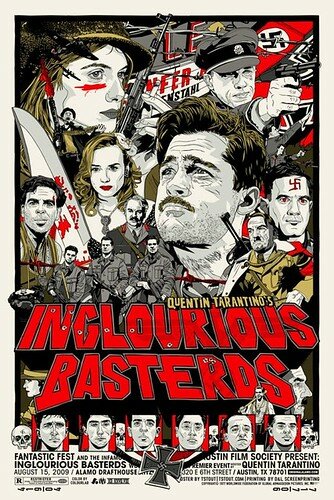I like Quentin Tarantino. His films, often laced with profanity and brutal violence, have witty dialogue, interesting characters, and can make mundane events such as dinner at a diner endlessly entertaining. It was for this reason that I decided to watch Inglourious Basterds, Tarantino’s gory revenge thriller about a fictional group of Jews that succeed in an attempt to assassinate Adolf Hitler.
Part one of a three part series on the films of Quentin Tarantino and their relevance to modern culture.
After watching the movie, I have to say that I had mixed feelings about it. The strongest aspect of it was Christoph Waltz’s sinister performance as Nazi commander Hans Landa. The movie was also incredibly suspenseful, the apex of this being the scene when a group of these Jewish assassins (codenamed the “Basterds”) go undercover in a German tavern in an effort to meet up with other agents. But by the end of the movie, after the Basterds bomb a theater premiering a Nazi propaganda film and everyone inside, including Adolf Hitler, dies, I felt a little uncomfortable. Perhaps I had no right to. Of course, Hitler was an evil man, and it would be hard to argue that he didn’t deserve such a gruesome end. The movie theatre that the Jews set ablaze contained not only the Fuher himself, but other top Nazi officials such as Joeseph Goebbels. If such an assasination actually took place, the war would have immediately ended, thus sparing hundreds of thousands of lives (though it is worth pointing out that Tarantino places his fantasy in 1945, when the war was winding down anyway).
But even still, there was something about the glee in which these Jews viciously murdered every last German in the theatre, the way in which two of the Jews repeatedly pumped Hitler’s corpse with lead over and over and over again, even when it was obvious that he was already dead, the almost brutal callousness with which these Jews often tortured Nazi officers that made me squirm a bit. I was unsettled by how Tarantino presented the clear, Manichean lines between good and evil, with an almost total disregard for the moral costs of war and violence. The absolute certainty and confidence this movie took in revenge was almost off putting.
Perhaps I wouldn’t have had such mixed feelings had I seen the movie in 2009, when Tarantino originally released it. But now, over ten years later, there may be more of a reason to be uncomfortable, as the word “Nazi” and “bigot” are now used to tar anyone who violates certain societal tabboos as completely undesirable. Just look at what happened to Brendann Eich, the former CEO of Mozilla Firefox who was the target of a sustained harassment campaign and eventually resigned over his revealed support for California’s Proposition 8, which banned same-sex marriage in California. Look at left wing students’ violent reactions to “white supremacist” speakers in places such as UC Berkley or Middlebury College. How about the unhinged rage the media went into when it was suspected that a bunch of white Catholic high schoolers harassed a Native American man (even when the established facts prove nothing of the sort actually happened?)
I think my discomfort with stems from the fact that I was watching the violent id of the Hollywood Left. It’s certainly not a coincidence that the mastermind behind the plan to assassinate Hitler owns a movie theater, and that she kills everyone by creating a makeshift bomb of flammable nitrate film. It’s clear that Tarantino and others are desperate to paint their own class as the heroes in a retelling of the modern West’s greatest moral struggle. But unlike the real World War II, where real people had to make real decisions, with real moral weight, about how to stop the menace of Nazism, Tarantino and others can hide behind the comfortable fantasy of an R-rated G.I. Joe episode. Do we have to worry about the fact that there may have been innocent people in that theater when it was bombed? No. Do we have to ponder the fact that the Basterds’ acts of tortue and violence often reach the levels of the Nazis themselves? Nope. It’s all just a movie. And at the end of the day, who cares right? We’re obviously the good guys! The Nazis are the evil ones! And if we’re good, and the other side disagrees with us, then they must be Nazis too! And okay, maybe we can’t kill them, but we can certainly make life miserable for them. We can protest, we can take things they have said out of context, we can refuse to listen to what they have to say, we can send the weight of entire websites to ban them and chase them away from the public square. But no one is getting hurt…and besides, we’re the good guys, so it’s not like we can do anything wrong, right?
Oh… did I forget to mention that the producers of Inglourious Basterds was Harvey Weinstein?
****
The next subject of this series will be Django Unchained.
Photo by sdfbss 



Comments
Leave a Reply